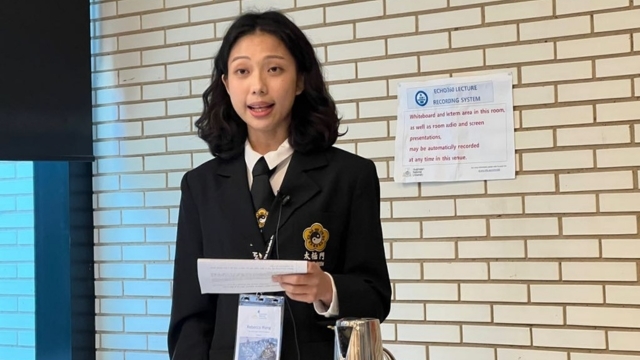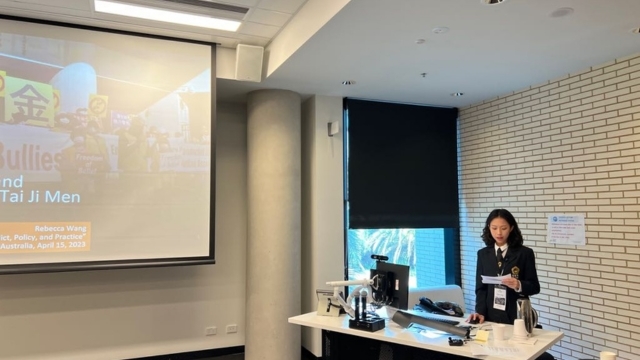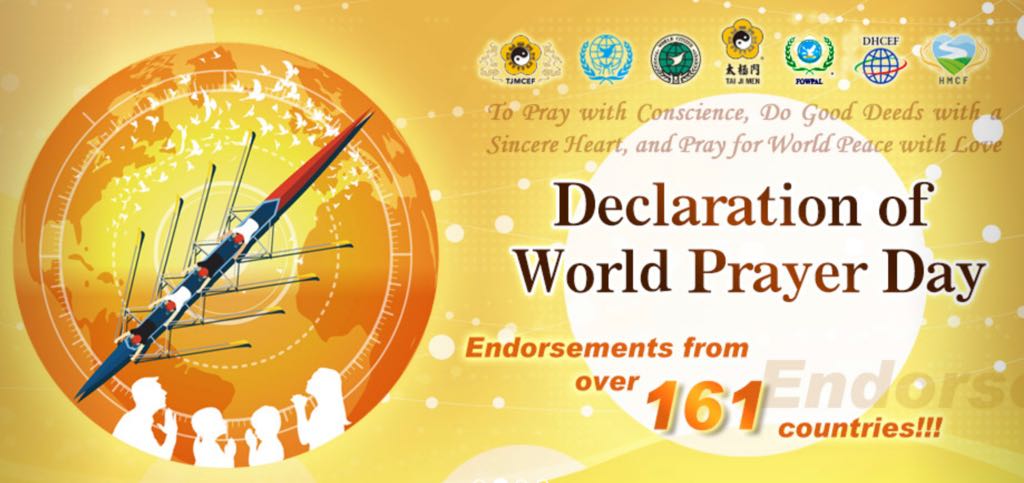A short history of how a fabricated case hit and harassed a spiritual movement for more than twenty years.
by Rebecca Wang*
*A paper presented at the international conference “Religion in Modern Education: Conflict, Policy, and Practice,” Australian National University, Canberra, Australia, April 15, 2023.

My name is Rebecca Wang, and I work as a project coordinator in a technology company. I am also a dizi (disciple) of Tai Ji Men and have been practicing Qi Gong and self-cultivation with the Shifu (Grand Master) of Tai Ji Men, Dr. Hong Tao-Tze, for over 27 years.
Before discussing the Tai Ji Men legal and tax case, I will say a few words about my experience as a dizi.
When I was one-year-old, my father took our family to Tai Ji Men to practice kung fu with our master, Dr. Hong. I went on to become a dizi and participate in several international Tai Ji Men events, including in India and Austria. I also joined the Tax and Legal Reform League as a volunteer, advocating for human rights in taxation, and the need for officials to implement good policies in order for people to live and work in peace and happiness.
We presented a cultural performance in the 2017 Universiade in Taipei. The temperature was about 37 to 38 Celsius in July and August in Taiwan. When we were practicing, the dance and the formations kept changing. I used to be frustrated because I could not keep pace with the adjustments. Nonetheless, I changed my mindset during the process, and tried my best. With this experience, I become more flexible and less stubborn when handling problems. For the nine-minute act, we danced throughout the whole performance without taking a rest. Every time I felt too exhausted to move, I recalled our Shifu telling us that practicing for the Universiade performance was a blessed activity. Therefore, I regained the energy to keep going and did not feel tired from wearing four layers of the performance costumes. The practicing process not only enhanced my physical fitness, but also strengthened my patience and perseverance.

In 2017, some dizi of Tai Ji Men, including myself, went to India with our Shifu for the 18th International Conference of Chief Justices of the World in Lucknow, to promote the Tai Ji Men message of love and peace. The conference was held at the City Montessori School, which invited chief justices from all countries in the world to discuss human rights, the rule of laws, peace, global issues, and so on.
At this conference, I met a judge from Bosnia and Herzegovina. I shared the Tai Ji Men ideas of love and peace with her. She had experienced wars in her country when she was a child. As a consequence, she could understand the importance of peace education, and how it would affect the children of her country. She also shared her experience of being a judge in a tormented country. She said that a decision from a judge in this situation could dramatically affect a person’s life, so she always made judgments very cautiously. During the communication with attendees at such conferences, it is very encouraging for us to see them getting inspired and willing to put into action principles of love, peace and conscience, which we believe is the most practical way to make the world a better place.
Legally, Tai Ji Men is a non-profit cultural organization. Dr. Hong, Tao-Tze, Zhang-men-ren or Shifu of Tai Ji Men, established the Tai Ji Men Qigong Academy in 1966, and has since established academies in Taiwan and the United States. Dizi express their gratitude by presenting the Grand Master with a gift of respect in the so-called “red envelopes,” which are typical of the master-disciple relationship in the Chinese tradition.
The Tai Ji Men case began as a criminal case in 1996, when Taiwan held its first direct democratic presidential election. At that time, some religious groups supported candidates other than the one by the ruling party, the Kuomintang, who eventually won the elections. After the elections, the leaders of these groups were arrested by the Kuomintang Justice Minister Liao Zheng-Hao in the name of a religious purge against groups accused of not having supported the ruling party, and their religious meeting places were closed down. Tai Ji Men was also affected by the case. Its Shifu, the Shimu (Shifu’s wife) and two dizi were arrested, accused of fraud and tax evasion. The academies and the private homes of several dizi were raided, and Tai Ji Men was harassed and slandered by the media in all possible ways.
Eventually, the defendants were released and found innocent in first degree and on appeal. On July 13, 2007, the Supreme Court ruled that the Tai Ji Men defendants had committed no fraud, no tax evasion, and no violation of the taxation laws, and were innocent of all charges.
However, the tax case that arose from the criminal case still exists today. Before he died, Shi Yuesheng, a tax officer of the National Taxation Bureau, confessed on video that the Tai Ji Men tax case was fabricated by prosecutor Hou Kuan-Jen, the man who started the Tai Ji Men case in 1996, who compelled officer Shi to perjure himself and claim he had performed an investigation he never started nor completed. Based on this false investigation, the National Taxation Bureau claimed that the gifts in the “red envelopes” were not non-taxable gifts but tuition fees for a so-called cram school, despite the fact that several Taiwanese authorities had already determined that Tai Ji Men was not a cram school. Tax bills were issued against Tai Ji Men for the years 1991 to 1996. Because of this ill-founded tax case, and the continued abuse of power by rogue bureaucrats, Tai Ji Men’s Shifu and dizi had to spend enormous times and resources along the lengthy road to administrative reliefs.

After the Supreme Court decision of 2007, which determined that Tai Ji Men was not guilty of tax evasion, the National Taxation Bureau after a long process corrected the tax bills for the years 1991 and 1993 through 1996 to zero. However, the different tax bills had been litigated in separate cases. For the tax bill of 1992, in 2006 (before the Supreme Court decision of 2007 in the criminal case) the Supreme Administrative Court had ruled against Tai Ji Men through what was technically a final decision.
Obviously, a wrong decision can always be revised, and this 2006 decision should have been revised taking into account the subsequent Supreme Court decision of 2007. However, based on the technical argument that the 2006 decision concerning the tax bill for 1992 was final, the National Taxation Bureau decided to maintain that tax bill, notwithstanding the contrary opinions of political and legal authorities. Based on the 2006 decision and the attitude of the National Taxation Bureau, in August 2020, the Administrative Enforcement Agency seized, unsuccessfully auctioned off, and confiscated land belonging to Dr. Hong, which was intended to be the site for a Tai Ji Men self-cultivation center. This generated widespread street protests, that still continue to this day, and Tai Ji Men was also supported by leading Taiwanese and international human rights experts and scholars.
I was one-year-old when the Tai Ji Men fabricated case happened. It was not until I grew up that I realized how much pressure and discrimination were exerted against us through media slander. Some of the dizi were mocked by their teachers and classmates at school; some were roared by pedestrians when going for dinner; some, the breadwinners in the family, even lost their jobs. Nonetheless, our Shifu still told us to love our country and to insist on doing the right things. We are willing to pay the taxes that should be paid. However, we will not pay the taxes that should not be paid.
Even though Taiwan claims to be a democratic country and has incorporated the two main United Nations covenants into its domestic legislation, the government continues to infringe on the freedom of belief of Tai Ji Men disciples through this long tax persecution. In fact, several experts believe that there are systemic problems in Taiwan in how the National Taxation Bureau operates. As a volunteer for the Tax and Legal Reform League, I learned that not only do Tai Ji Men dizi suffer from legal tax persecution, but also many tax victims in Taiwan have lost their social positions and even their families because of a wrong tax bill.
Take Li Yongxian, a tax victim, as an example. Global inflation and rising prices of housing made it very difficult for young Taiwanese to buy a house. When Li was young, he saved hard to buy his first house, but unfortunately, he could not afford the huge mortgage, so he had to sell the house he lived in the next year. He made no profit at all in the process, but received an exorbitant tax bill from the National Taxation Bureau, charging him over $1 million in luxury taxes plus a fine of over $1 million, a consequence of a policy from the then Minister of Finances Chang Sheng-Ford, whose consequences were catastrophic. Even though the luxury tax policy is no longer in force, Li is still suffering from this illegal tax bill, and is even forced to pay a portion of his monthly salary to the state treasury.

What is even more absurd is that during Chang Sheng-Ford’s tenure as Minister of Finance, he made a hasty decision to introduce a stock exchange income tax based on faulty considerations, resulting in the evaporation of 2.2 trillion NT dollars in stock market value, a shortfall of 55 billion NT dollars in securities transaction tax, and a net outflow of 45.3 billion NT dollars in foreign capital in just five months, leading to economic losses in Taiwan, as well as a further compression of taxpayers’ rights. It also appears that in Taiwan officials who made wrong decisions are not regarded as responsible for their own mistakes. They can continue to teach in schools after stepping down from politics, and enjoy the benefits provided by the state. This is part of the well-know corruption problems that affects Taiwan.
In late 2021, 25 international experts submitted “A Letter to President Tsai on the Tai Ji Men Case” to President Tsai Ing-Wen of Taiwan, stating that, “The Tai Ji Men case is, in fact, a test for Taiwan’s program of transitional justice. The Tai Ji Men case is a relic of a by-gone era, when religious liberty was still not fully respected in Taiwan. The action against Tai Ji Men, however, raises doubts on whether the problems of the past authoritarian regimes have been fully overcome. The case has also significant international implications, as there is widespread concern that tax laws may be used to discriminate against religious and spiritual movements that some politicians or bureaucrats, for whatever reason, do not like. The European Court of Human Rights and courts in the U.S. have stated that such uses of the tax system inappropriate and illegal.”
Despite the state violence in Taiwan, my master, Dr. Hong Tao-Tze, has continued to lead his disciples to promote the culture of peace with love and conscience.
On October 16, 2022, Tai Ji Men and over 500 community organizations co-hosted “Conscience Illuminating the World: International Ceremony for Love and Peace.” Dr. Hong announced in a “Declaration of World Prayer Day” that October 16 will be designated as “World Prayer Day” every year to encourage the people of the world to collectively pray for themselves, others, and the world, to restore their inherently pure hearts, to pray with their conscience, to perform good deeds with sincere hearts, and to pray for the cessation of wars, for the end of epidemics and diseases, for the safety of everyone, for world peace, and for the coexistence and co-prosperity of all, so that the positive energy of the universe will lead the Earth to the path of sustainable development.

In this prayer ceremony, I performed the “blessing of the divine Animals” with my brothers and sisters. The Tai Ji Men dragon represents “compassion, courage, and true wisdom;” and the peacock represents “tasting all poisons and exhaling fragrance.” In my 28 years of life, I spent 27 years living with the Tai Ji Men case. However, under the leadership of my Shifu, I did not become cynical, and continued to love Taiwan, stick to justice, insist on doing the right thing, and promote love, peace, and conscience. This is exactly what peacocks practice in their daily lives by “tasting all poisons and exhaling fragrance.”
Even more, on the way to tax and legal reform, I realized the meaning of the principle “see yourself, see heaven and earth, and then see everyone.” After seeing the legal tax persecution that hit Tai Ji Men and other tax victims, I became more courageous. During the years between college and my working career, I took to the streets no matter whether it was rainy or sunny. I wanted to tell the National Taxation Bureau to revoke the illegal taxation bills. I wanted to tell the Administrative Enforcement Agency to revoke the illegal enforcement.
As my Shifu said, “Good education comes from good culture, and good education comes from good economy. Because we love this country, we do not submit to the bureaucratic tax system in Taiwan; because we love the world, we travel to all five continents to spread the seeds of love and peace. On the road to legal tax reform, many righteous people have united together to call on the Taiwanese government to resolve the Tai Ji Men case. Only when public power implements human rights protection can true democracy and true freedom be realized.”
For more information, please refer to https://taijimencase.org/, which provides hundreds of articles and documents on the Tai Ji Men case.
Source: Bitter Winter

